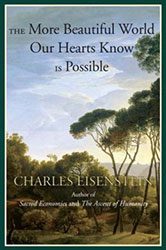 For over forty years, I’ve celebrated each Christmas season by watching It’s a Wonderful Life. I’m sure I’m not the only who has to reach for a handkerchief in the course of observing George Bailey’s adventures in self-discovery. Overwhelmed by financial failure and the frustrations of daily life, Bailey contemplates suicide until he is confronted by an angelic visitor who shows him the panorama of his life: despite his regrets about missing out on his great dream of traveling the world, Bailey discovers that the world was transformed by his daily, oft-forgotten acts of kindness and civic duty – housing for the working poor, saving his brother’s life, meeting and marrying his wife. In the fabric of relatedness, his life matters – and as the message of the film implies, so do ours. The film challenges us to ask: What would the world have been like without you? Looking ahead, what might the world be like if today were your last day?
For over forty years, I’ve celebrated each Christmas season by watching It’s a Wonderful Life. I’m sure I’m not the only who has to reach for a handkerchief in the course of observing George Bailey’s adventures in self-discovery. Overwhelmed by financial failure and the frustrations of daily life, Bailey contemplates suicide until he is confronted by an angelic visitor who shows him the panorama of his life: despite his regrets about missing out on his great dream of traveling the world, Bailey discovers that the world was transformed by his daily, oft-forgotten acts of kindness and civic duty – housing for the working poor, saving his brother’s life, meeting and marrying his wife. In the fabric of relatedness, his life matters – and as the message of the film implies, so do ours. The film challenges us to ask: What would the world have been like without you? Looking ahead, what might the world be like if today were your last day?
Charles Eisenstein’s The More Beautiful World Our Hearts Know is Possible epitomizes what I’ve come to call “The George Bailey Principle,” the recognition that small acts make big differences. Eisenstein asserts that we live in an intricately interdependent world in which any action can contribute to the well-being or diminishment of both parts and whole. The modern world, leaving destruction in its wake, is based on the illusion of separation. While images of individualism have inspired agency and creativity, the rugged self-made person has been, on balance, destructive to our planet and its most vulnerable human and non-human creatures. This philosophy of separation has led to the dualisms of matter and spirit, person and environment, individual and society. These dualisms, when determinative of economics and lifestyle, have been disastrous for the planet, and its flora and fauna. They celebrate “my” money, “my” property, “my” business, “my” body, “my” guns, “my” corporate profits, and “my” national sovereignty without consideration of the human and non-human costs of such myopic thinking.
Eisenstein celebrates human creativity, and sees it as part of a larger fabric of interdependence. From this perspective, our creativity can heal the world and make life more beautiful for our human and non-human companions on Earth.
This is where the “George Bailey Principle” comes in. It is a “wonderful life” when we learn that life is a constant call and response. Life calls us to responsibility – that is, responsiveness to our world – and we respond by giving the gift of compassion and concern in this present moment. Each moment ripples across the universe: Bailey’s saving of his brother’s life implicitly enables him to become a war hero, whose courage indirectly saves multitudes; Bailey’s love for his wife brings beautiful and lively children in the world, and also brings love into a life that might otherwise be solitary; Bailey’s generous care for his neighbors provides housing and future possibilities of thousands of working poor persons and their children. The smallest deed can be a tipping point, bringing life and light to our world. This is the gift of interdependence that Eisenstein affirms.
Jesus once told a parable about a mustard seed. Jesus describes it as the smallest of seeds that grows into a great plant giving shelter to all around. Chaos theorists identify the butterfly effect as both meteorological and spiritual principle. The flapping of wings on one side of the country can change the weather on the other side of the nation. Small actions done over and over again can change the world.
I am appreciative of Mother Theresa’s counsel to do something beautiful for God. It serves a guide for our interpersonal and institutional relationships: Do I want by this word or act to give God more or less beauty? Is this policy creating beauty or leaving destruction in its wake? In loving the creatures, I love the creator, overcoming the dualism of God and the world and heaven and earth.
Hopelessness is a major source of today’s inability to respond to planetary crises. We feel so small, and our efforts insignificant, compared to the machinations of multinational corporations and institutions for whom profit trumps trump and care for the future. But, there is hope in the mustard seed. There is promise in an interdependent world: while one act cannot heal the Earth, one positive thought, word, or deed can contribute to an ecology of healing and wholeness; it can create a field or resonance enabling new possibilities to emerge that bring healing and wholeness to our lives and the good Earth.
Aware of the positive difference small acts can make, we can begin to see ourselves as what Eisenstein describes as “miracle-workers.” We can become the change we want to see in the world and then out of our transformed lives, change the world for the best. We can in small intentional actions done over and over again be partners with other like-minded souls and, dare I say, God in healing the world in this most desperate time.
For more on The More Beautiful World Our Hearts Know is Possible, visit the Patheos Book Club here.













